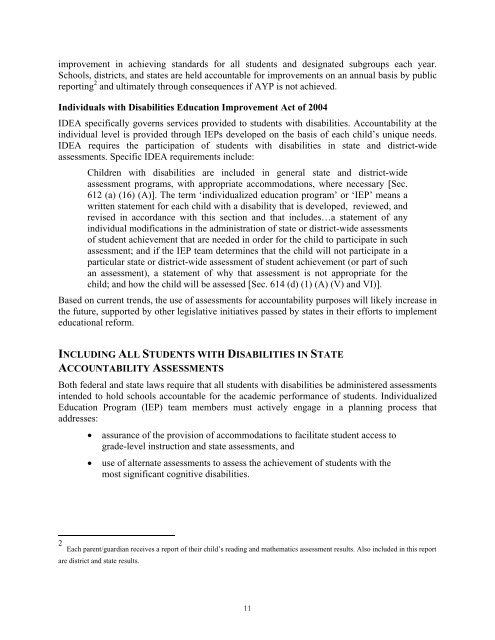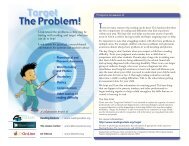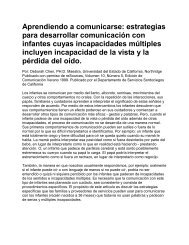ACCOMMODATIONS MANUAL - The Office of Special Education ...
ACCOMMODATIONS MANUAL - The Office of Special Education ...
ACCOMMODATIONS MANUAL - The Office of Special Education ...
Create successful ePaper yourself
Turn your PDF publications into a flip-book with our unique Google optimized e-Paper software.
improvement in achieving standards for all students and designated subgroups each year.<br />
Schools, districts, and states are held accountable for improvements on an annual basis by public<br />
reporting 2 and ultimately through consequences if AYP is not achieved.<br />
Individuals with Disabilities <strong>Education</strong> Improvement Act <strong>of</strong> 2004<br />
IDEA specifically governs services provided to students with disabilities. Accountability at the<br />
individual level is provided through IEPs developed on the basis <strong>of</strong> each child’s unique needs.<br />
IDEA requires the participation <strong>of</strong> students with disabilities in state and district-wide<br />
assessments. Specific IDEA requirements include:<br />
Children with disabilities are included in general state and district-wide<br />
assessment programs, with appropriate accommodations, where necessary [Sec.<br />
612 (a) (16) (A)]. <strong>The</strong> term ‘individualized education program’ or ‘IEP’ means a<br />
written statement for each child with a disability that is developed, reviewed, and<br />
revised in accordance with this section and that includes…a statement <strong>of</strong> any<br />
individual modifications in the administration <strong>of</strong> state or district-wide assessments<br />
<strong>of</strong> student achievement that are needed in order for the child to participate in such<br />
assessment; and if the IEP team determines that the child will not participate in a<br />
particular state or district-wide assessment <strong>of</strong> student achievement (or part <strong>of</strong> such<br />
an assessment), a statement <strong>of</strong> why that assessment is not appropriate for the<br />
child; and how the child will be assessed [Sec. 614 (d) (1) (A) (V) and VI)].<br />
Based on current trends, the use <strong>of</strong> assessments for accountability purposes will likely increase in<br />
the future, supported by other legislative initiatives passed by states in their efforts to implement<br />
educational reform.<br />
INCLUDING ALL STUDENTS WITH DISABILITIES IN STATE<br />
ACCOUNTABILITY ASSESSMENTS<br />
Both federal and state laws require that all students with disabilities be administered assessments<br />
intended to hold schools accountable for the academic performance <strong>of</strong> students. Individualized<br />
<strong>Education</strong> Program (IEP) team members must actively engage in a planning process that<br />
addresses:<br />
• assurance <strong>of</strong> the provision <strong>of</strong> accommodations to facilitate student access to<br />
grade-level instruction and state assessments, and<br />
• use <strong>of</strong> alternate assessments to assess the achievement <strong>of</strong> students with the<br />
most significant cognitive disabilities.<br />
2 Each parent/guardian receives a report <strong>of</strong> their child’s reading and mathematics assessment results. Also included in this report<br />
are district and state results.<br />
11





